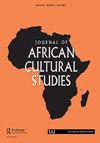Rethinking Human-Centredness and Eco-Sustainability in an African Setting: Insights from Luganda Folktales
IF 0.9
2区 社会学
Q2 CULTURAL STUDIES
引用次数: 4
Abstract
ABSTRACT This article reflects on an alternative mode of anthropocentrism emergent from representations of human–nonhuman relations in a selection of Ganda folktales. In particular, it addresses some major claims against anthropocentrism: the failure to recognise the importance of holism; the overlooking of the intrinsic value of nonhuman elements; and the undue emphasis on the ontological divide between humans and other entities. The article is based on a descriptive qualitative study utilising data from folktales as repositories of both the ancient and experiential wisdom of the Baganda. It focuses on five carefully selected stories, recorded during live performances in Mpigi District of Uganda in 2019, on the theme of human–nonhuman relations. The article argues that while the Ganda folktales selected in this study would generally be considered as advancing anthropocentrism, they exhibit a commitment to environmental sustainability in ways that interrogate the anthropocentrism–ecocentrism dichotomy. Through a blend of thematic and structural narrative analysis of the folktales, the study reveals that a communitarian social setup could promote a balanced stance in human relations with the nonhuman. This study, thus, challenges the blanket disparagement of anthropocentrism in contemporary environmental scholarship.重新思考非洲环境中的以人为本和生态可持续性:来自卢甘达民间故事的见解
摘要:本文反映了一种人类中心主义的替代模式,这种模式是从一组甘达民间故事中对人类与非人类关系的表现中产生的。特别是,它解决了一些反对人类中心主义的主要主张:未能认识到整体论的重要性;对非人因素内在价值的忽视;以及过分强调人类和其他实体之间的本体论分歧。本文基于一项描述性定性研究,利用民间故事中的数据作为巴干达人古老智慧和经验智慧的资料库。它侧重于2019年在乌干达Mpigi地区的现场表演中精心挑选的五个故事,主题是人与非人的关系。文章认为,虽然本研究中选择的甘达民间故事通常被认为是推进人类中心主义,但它们以质疑人类中心主义-生态中心主义二分法的方式表现出对环境可持续性的承诺。通过对民间故事的主题叙事与结构叙事相结合的分析,揭示了社群主义的社会结构能够促进人与非人关系的平衡。因此,这项研究挑战了当代环境学术对人类中心主义的全面贬低。
本文章由计算机程序翻译,如有差异,请以英文原文为准。
求助全文
约1分钟内获得全文
求助全文
来源期刊

Journal of African Cultural Studies
Multiple-
CiteScore
1.70
自引率
10.00%
发文量
13
期刊介绍:
The Journal of African Cultural Studies publishes leading scholarship on African culture from inside and outside Africa, with a special commitment to Africa-based authors and to African languages. Our editorial policy encourages an interdisciplinary approach, involving humanities, including environmental humanities. The journal focuses on dimensions of African culture, performance arts, visual arts, music, cinema, the role of the media, the relationship between culture and power, as well as issues within such fields as popular culture in Africa, sociolinguistic topics of cultural interest, and culture and gender. We welcome in particular articles that show evidence of understanding life on the ground, and that demonstrate local knowledge and linguistic competence. We do not publish articles that offer mostly textual analyses of cultural products like novels and films, nor articles that are mostly historical or those based primarily on secondary (such as digital and library) sources. The journal has evolved from the journal African Languages and Cultures, founded in 1988 in the Department of the Languages and Cultures of Africa at the School of Oriental and African Studies, London. From 2019, it is published in association with the International African Institute, London. Journal of African Cultural Studies publishes original research articles. The journal also publishes an occasional Contemporary Conversations section, in which authors respond to current issues. The section has included reviews, interviews and invited response or position papers. We welcome proposals for future Contemporary Conversations themes.
 求助内容:
求助内容: 应助结果提醒方式:
应助结果提醒方式:


